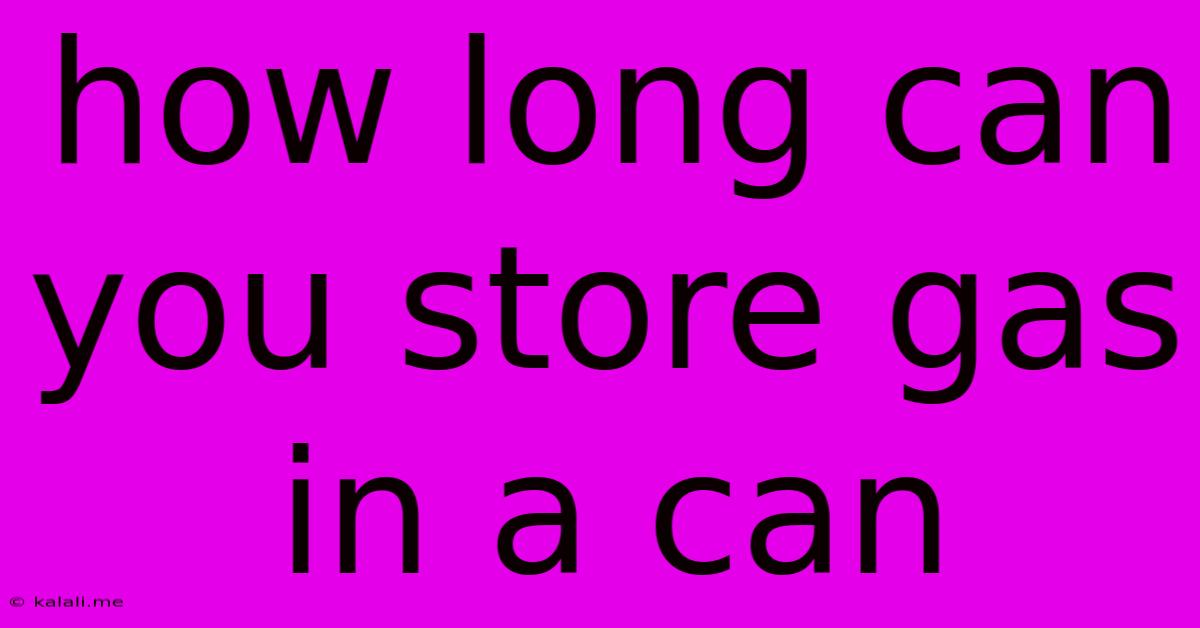How Long Can You Store Gas In A Can
Kalali
May 23, 2025 · 3 min read

Table of Contents
How Long Can You Store Gas in a Can? A Comprehensive Guide
Knowing how long you can safely store gasoline in a can is crucial for anyone who owns a generator, lawnmower, or other gasoline-powered equipment. Storing gasoline improperly can lead to a decrease in fuel quality, engine damage, and even fire hazards. This guide will delve into the factors affecting gasoline shelf life and provide practical tips for proper storage.
Understanding Gasoline Degradation: Gasoline is a volatile mixture of hydrocarbons, and over time, it undergoes a process of degradation. This process is influenced by several factors, resulting in a decrease in octane rating, the formation of gums and varnishes, and the evaporation of lighter hydrocarbons. These changes can severely impact your engine's performance and longevity.
Factors Affecting Gasoline Shelf Life:
- Container: The type of container significantly impacts gasoline's shelf life. Metal cans are generally better than plastic ones, as they offer better protection against light and oxygen. Approved fuel containers designed specifically for gasoline storage are the best option, as they are usually airtight and UV-resistant.
- Temperature: Extreme temperatures, both hot and cold, accelerate the degradation process. Ideal storage temperature is a cool, dry place, away from direct sunlight.
- Exposure to Air and Light: Oxygen and ultraviolet (UV) light react with gasoline, accelerating the breakdown of its components. Airtight containers stored in a dark, cool place are vital for preserving gasoline quality.
- Fuel Additives: Gasoline typically contains additives designed to improve stability and prevent gum formation. However, the effectiveness of these additives diminishes over time. Consider using a fuel stabilizer to extend the shelf life of stored gasoline.
- Gasoline Type: The type of gasoline also plays a role. Regular gasoline generally has a shorter shelf life compared to higher octane fuels.
How Long Can You Really Store Gasoline?
While many sources suggest a 3-month shelf life, this is a generalization. Under ideal storage conditions (airtight container, cool, dark place, fuel stabilizer), gasoline can remain usable for up to 6 months, though its quality might start to degrade. Beyond that point, significant performance issues and potential engine damage become increasingly likely. After one year, it's highly recommended to discard the gasoline.
Signs of Deteriorated Gasoline:
- Discoloration: Gasoline should be clear; a cloudy or dark appearance indicates degradation.
- Sediment: The presence of sediment or particles at the bottom of the can is another sign of spoilage.
- Strong Odor: A noticeably stronger or different smell than fresh gasoline can be a warning sign.
- Poor Engine Performance: If your engine sputters, misfires, or runs poorly after using stored gasoline, it's likely the fuel has deteriorated.
Best Practices for Gasoline Storage:
- Use only approved fuel containers.
- Store in a cool, dark, and well-ventilated area.
- Keep the container tightly sealed.
- Label the container with the date of storage.
- Consider using a fuel stabilizer to extend shelf life.
- Dispose of old gasoline properly according to local regulations.
By following these guidelines, you can ensure the safety and longevity of your stored gasoline and avoid potential problems with your gasoline-powered equipment. Remember, preventing fuel degradation is key to maintaining both your equipment and your safety. Always prioritize proper handling and disposal of gasoline to minimize environmental impact.
Latest Posts
Latest Posts
-
First Breath Out Of Water Word
May 23, 2025
-
How To Answer The Phone In Lollipop Chainsaw
May 23, 2025
-
Cannot Find Name For Group Id
May 23, 2025
-
Can You Have Car Insurance With Two Different Companies
May 23, 2025
-
Car Makes Grinding Noise When Braking
May 23, 2025
Related Post
Thank you for visiting our website which covers about How Long Can You Store Gas In A Can . We hope the information provided has been useful to you. Feel free to contact us if you have any questions or need further assistance. See you next time and don't miss to bookmark.